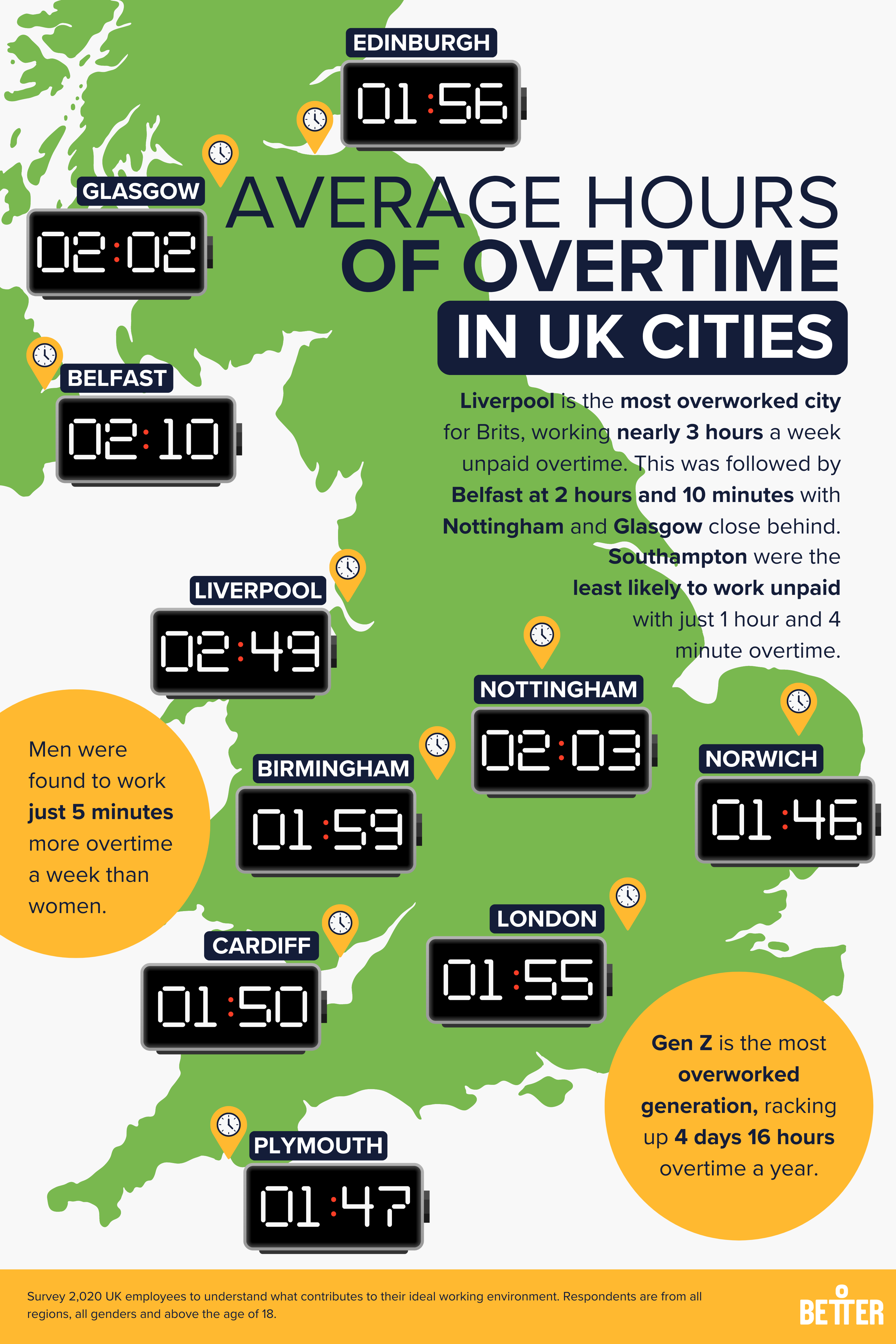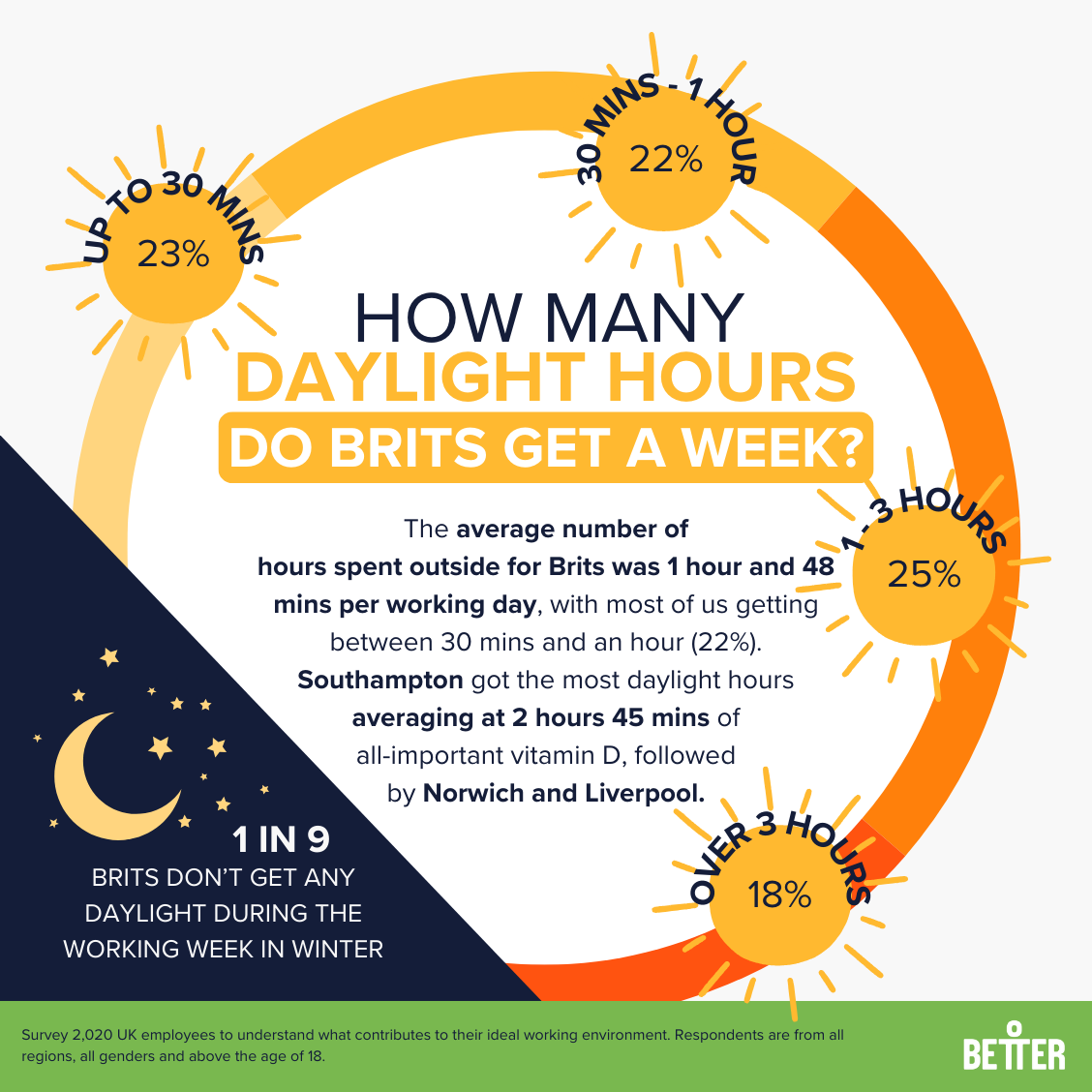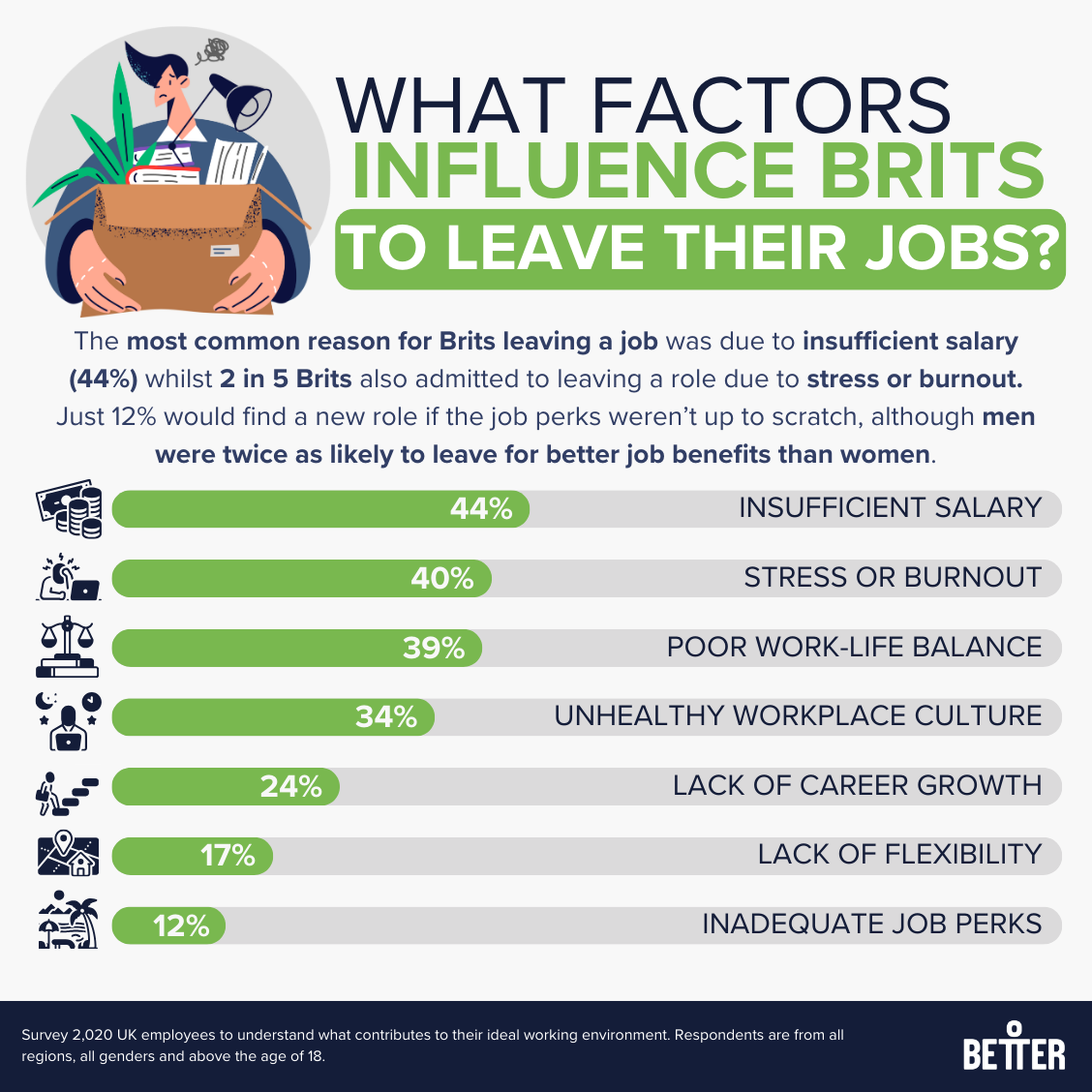Workplace Wellbeing Study: The impact of work on physical and mental wellbeing
The world of work has shifted for so many over the last few years, with working from home and hybrid working now a central aspect of working life. However, with numbers showing that people sidelined from work due to illness are on the rise and sick leave hitting a 10-year high, it is clear that improving the mental and physical health of employees so that people are happier and healthier needs to be a top priority.
We spoke to over 2,000 people in the UK about their workplace to understand what contributes to their ideal working environment, what benefits are most important to them, and how work impacts their mental health, as we explore the dynamics between the evolving nature of work and the wellbeing of individuals.
Health impact: The toll of physical and mental stress on employee wellbeing
Our survey revealed the average number of sick days taken in the past year was four, with physical sickness being the biggest reason for those absences (56%). However, 23% cited mental health issues, and 18% said fatigue caused their absences, suggesting many feel overworked and pushed to burnout in their busy work lives. Furthermore, one in ten people has taken time off for musculoskeletal-related complaints such as back pain, something that can be caused by sitting for long periods of time.
Indeed, it isn’t just poor seating that leads to a job impacting health. A huge 81% of people said that their job has a negative impact on their wellbeing or mental health. The issues impacting health are an excessive workload and pressure (34%), dissatisfaction with salary (25%), a lack of recognition or appreciation (24%), and poor support from colleagues or superiors (17%).
For many, having a job that actually reduced their ability to stay physically active (17%) was also a problem, whether that be because of working late and being unable to go to the gym or if they are too busy to even take a lunchtime stroll in the daylight. A job causing irregular and unhealthy eating patterns was also an issue for 16% of people, while the same number of people had issues with a job that caused their sleeping patterns to become irregular.
Our research revealed that 47% across the UK say working from home increases their ability to workout, helping them to use their additional time at home to get moving. Northern Irish workers saw the biggest benefit in this regard, with 58% agreeing their working from home routine helps them keep more active, followed by Scotland (55%), London (52%), the South East (52%), East England (45%), and Yorkshire and the Humber (42%).
Overtime strain: Unravelling the impact on sleep and wellbeing
Disruptions to sleep and personal health routines are clearly undesirable aspects of a job, and overworking outside of contracted hours can be a big cause of this. According to our research, the average person in the UK works nearly 2 hours a week more than they should, and a worrying one in eight people works an extra 4 hours a week beyond their scheduled hours.
Interestingly, on average, the younger generation works overtime the most, with Gen Z working an average of 2 hours and 9 minutes overtime each week. Over a whole year, that works out as young people spend an average of over 112 hours working overtime.

It may then come as no surprise that 68% of the UK say they can find it hard to switch off from work during the evenings, with 59% also saying they can struggle to take their mind off work on the weekends too. This persistent struggle to disconnect from work takes a toll not only on our sleep and overall wellbeing but also on our ability to enjoy leisure time. Finding moments to relax, counterbalance the demands of a hectic work schedule, and cultivate a healthier lifestyle are crucial, including spending quality time outdoors.
Our previous research highlighted how important time spent outdoors around green and blue spaces is for our physical and mental health, but overworking can become a barrier to this valuable time in nature. This time, our research explored how much time people spent outside in the daylight during the average work week, with a shocking 1 in 10 people saying they spend no time whatsoever outside during the average work day, while around a third of people spend under 30 minutes in daylight.

When it comes to job industries, those working in architecture, engineering, and building spent the most time in daylight, claiming an average of just over 3 hours per day, followed by those in the travel and transport industry (2.83 hours) and marketing professionals (2.38 hours). In contrast, people working in the legal field got outside the least, with just 1.29 hours on average spent outside during the day.
It was also discovered that men were managing to spend 41% more time outdoors than women, with men achieving an average of 2 hours and 9 minutes soaking up vitamin D, while women were only managing an average of 1 hour and 32 minutes. Studies have shown that women are more likely to suffer from skeletal issues lacking vitamin D than men, and it is particularly important for menopausal women to meet their vitamin D needs as it can ease symptoms and prevent age-related osteoporosis.
Wellbeing wishlist shows the desires for employee benefits
While being able to spend quality time outdoors is certainly a strong perk for our wellbeing, we asked the UK what their current workplace offers in terms of health and wellbeing benefits and whether they find (or would find) the perks beneficial.

At the top of the list were generous annual leave (73%) and generous sick leave (66%), and the new world of flexible working and hybrid options was third highest on the priority list (60%). A majority were also very keen on being offered a 4-day working week, yet while 60% want this benefit, 53% of people say their work doesn’t offer it.
In terms of health-related benefits, 49% would find gym memberships or gym discounts beneficial, despite 53% saying their work doesn’t offer them. Over half of Brits (54%) also said mental health support services would be beneficial to them, yet 36% of workplaces are not offering their employees this.
Interestingly, those in the IT industry are reaping the most health-related rewards, with 51% saying their work offers gym memberships or other fitness class discounts, and 64% saying they received mental health support—the highest among all the industries for these benefits.
Job benefits like these are important, with more than 1 in 10 claiming they would leave a job if the perks weren’t good enough. The main reason for leaving a job was due to insufficient salaries (44%), while stress and burnout (40%) and poor work-life balance (39%) were two of the biggest reasons, highlighting the importance of being supported mentally and not overworked in a role.
In Summary
In conclusion, our Workplace Wellbeing Study paints a vivid picture of the modern work landscape and its impact on employee health and happiness. We're seeing a concerning uptick in sick leave, with physical and mental health issues taking center stage. From heavy workloads to feeling undervalued, there are numerous stressors affecting people's daily grind.
Moreover, the prevalence of overtime work, particularly among the younger generations, highlights the challenge of disconnecting from work obligations, which in turn affects sleep patterns and overall quality of life. The study also emphasises the importance of outdoor exposure for health, with the need to stay active and spend time outdoors being extremely important for both mental and physical health.
So if you feel like you’re sitting down too much at work, not spending enough time outdoors, and not getting your body moving as much as you think you could during the workday, make sure to avoid letting your job take priority over your health, and consider implementing positive changes.
Ultimately, fostering a supportive work environment that values employee wellbeing not only improves productivity and retention but also contributes to a healthier and happier workforce. As we navigate the evolving landscape of work, it is important for employers to create a workplace that prioritises health and happiness, not only boosting morale but also enhancing productivity and retention in the long run.


